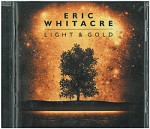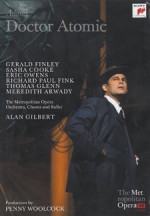Column Name
Title
Eric Whitacre: Light and Gold (Decca B0014850-02)
Body
The multitalented Eric Whitacre (M.M. ’97, composition) is perhaps best known for creating his Virtual Choir; its performance of Lux Aurumque (Light and Gold), created by electronically combining singers from all over the world, has been viewed more than three million times on YouTube. For this recording—which won the 2011 Grammy Award for best choral performance—he uses two vocal groups, Laudibus and his nonvirtual ensemble, the Eric Whitacre Singers. Special guests making cameo appearances include the King’s Singers, the Pavão Quartet, pianist Christopher Glynn, and soprano Hila Plitmann (B.M. ’95, M.M. ’97, voice), Whitacre’s wife.
With a short text by Edward Esch, the title track is luminous, as one might expect, but a work Whitacre wrote in 2000, Three Songs of Faith (with texts by E.E. Cummings), reveals more about its creator’s compositional process. After the initial performance, he decided to rework the final section, “I thank You God for most this amazing day,” eliminating what he later found to be its “ridiculously difficult” choral complexity. For this recording, he used this revision. “It’s so much more simple, and humble, and to my ears, the meaning of the text now explodes off the page,” he explains in his absorbing liner notes. “I think of those measures every time I start to ‘overthink’ while I’m writing.”
Echoes of the Renaissance float through Leonardo Dreams of His Flying Machine (2001), and in A Boy and a Girl (2002) Whitacre deploys gentle dissonances—and well-placed rests—to illuminate a poem by Octavio Paz. In the latter, Whitacre writes that he feels a special affinity for a portion of the final line, “Saying nothing, never kissing, giving silence for silence”; the melismas that haunt the words “never kissing” may be the “truest notes I’ve ever written.” Engineer Andrew Mellor, working in London’s St. Silas Church, has captured every bit of the combined choirs’ accuracy and vocal splendor.
(Whitacre’s Virtual Choir 3 will debut on April 2 at 6:30 p.m. at Lincoln Center’s David Rubenstein Atrium, and his recording Water Night will be released April 3.)
John Adams: Doctor Atomic. Metropolitan Opera Orchestra, Chorus, and Ballet, Alan Gilbert, conductor. With Thomas Glenn, Gerald Finley, Eric Owens, Sasha Cooke, and Richard Paul Fink. (Sony Classical 88697 80665 9)
In 2008 the Metropolitan Opera presented the highly anticipated New York premiere of John Adams’s Doctor Atomic, conducted by Juilliard alum Alan Gilbert, who’s now director of conducting and orchestral studies, in a production by Penny Woolcock. Now the Met’s Live in HD broadcast has been released on a handsomely produced DVD that won this year’s Grammy Award for best opera recording.
To tell the story of the birth of the atomic bomb, librettist Peter Sellars assembled fragments from sources as diverse as the poems of Muriel Rukeyser and Charles Baudelaire, to factual accounts of the time and life in the Manhattan Project (the government’s code name for the testing program). In the role of J. Robert Oppenheimer, Gerald Finley leads a starry cast that includes Sasha Cooke (M.M. ’06, voice) as his wife, Kitty Oppenheimer, and Eric Owens as General Leslie Groves, who is filled with anxiety about the success of the operation. Finley’s taut performance shows Oppenheimer as confident while also riddled with doubt; his much-lauded showstopper “Batter my heart, three person’d God” uses sorrowful lines from John Donne to propel the first act to its conclusion. And Cooke is at her best in “Am I in your light?”, a heartbreaking glimpse of a woman who suspects that she is not the main object of her brilliant husband’s attention.
In the first Met presentation to use amplification (Adams’s palette includes electronic sounds), Gilbert and the Met Orchestra make the most of the eclectic score. Sweeping orchestral interludes not only facilitate changes in the physical set (a warren of boxes, handsomely conceived by Julian Crouch) but also add to the sense of dread, of waiting for the moment that will change everyone’s lives forever, the detonation. Just before the blast, Adams combines a warning siren, tolling chimes, orchestral pizzicatos, a celesta, and a ticking clock before electronic sounds crescendo, chillingly overpowering everything else––and then leave in their wake the voices of the bomb victims pleading for water.
Watching this DVD, which was taped in November 2008, may provide an even better way to experience this production than watching it live. Veteran director Gary Halvorson and his crew include many effective close-ups of the cast, to emphasize the endless waiting, as well as the fear haunting them that their groundbreaking work—noble as it may seem—will ultimately lead to decisions that are agonizingly irreversible.






